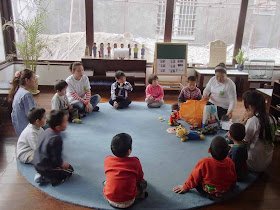We recently spent a morning with Fei Fei, and want to share
more about her work with Little Flower:
What is your job for
Little Flower?
Manager of the group home project.
What kind of work
does that entail?
Basically, I keep in contact with the parents and teachers
of the kids in the group homes. I talk with the parents about the kids and how
they’re doing, and I also talk with the teachers about how the kids are doing
in school. The parents come to me when they have questions about medical care
or therapy. The kids in the group homes
are older, and as they grow they keep asking more questions about themselves
and their past, so I try to answer them. I make sure the parents have the physical
and emotional resources they need for their very tough job. I am responsible for seeing that everyone has the clothing and
shoes, the wheelchairs, walkers, crutches and braces that they need for daily
life etc. I also handle practical things
like purchasing food in wholesale quantities (with 30 kids we go through a lot
of food!) and organizing local donations of supplies and volunteers. I’m also in charge of the apartments we rent for
our families and deal with repairmen and landlords when there is a problem. Because my English is good, I also act as
translator when needed. I am a nurse by
training, but my job responsibilities are quite varied!
How do you start a
typical work day?
I come into the office in the morning and check my e-mail,
replying to the more urgent messages. Then I check my to-do list for the day.
Usually, I’ll have made the to-do list the day before.
How did you hear
about LFP?
I heard about it from one of my teachers in college, who is
a friend of Brent.
How did you start
working for LFP?
I heard a lot about the orphan work from that teacher, and
was so impressed by it that I volunteered in 2007. I began working here after
three weeks of volunteer work.
What is the most
rewarding part of your work?
Keeping the group homes running to LFP’s high standards, and
making sure the kids get the best care possible.
What’s the most
challenging part of your work?
As the kids grow up, they need more than just food and
medical care. They need to be educated in school and also in how to accept
themselves and enter into society.
Growing up as a disabled person in China is very challenging!
What’s one good
memory that stands out to you because of your work?
After I talked with the people and the managers of the
housing complex where the group homes are located, the group home families
started working more with the other people and making friends with them. This
helps the kids get used to other people in our local community.
Where are you from
originally?
I am from Henan province, which is southwest of Beijing.
A morning with Fei
Fei:
On a recent morning, Fei Fei was in the office meeting with
the mother of Group Home 6 and a boy who’d had a recent surgery done on his
eye. It was still a bit red and sensitive, so she taped some gauze over it to
protect it, showing the boy the gauze and explaining what she was doing as she
carefully taped it over his eye.
After that, Fei Fei went to meet with the mom of Group Home
3 about one of her boys’ homework. Before she went over, she printed out a sheet
of math formulas.
Then she went to Group Home 5 to talk with them about trying
to get their front door replaced, since it was broken and the landlord wouldn’t replace it for
them. There was a smaller boy in the home, named Kun, who had recently arrived.
He seemed to be very close with his group home mother, and later Fei Fei said
that he used to be very shy and scared of strangers, crying whenever he saw
someone he didn’t know.
“He’s gotten better, though. I try to visit him every day,
so he can get to know me.”
It seems that Fei Fei’s visits have had the desired effect;
when she left, he blew her a kiss.





















